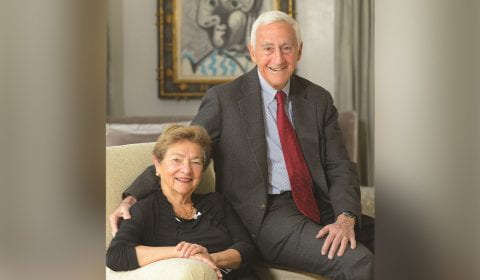
The shades on the Vagelos Laboratory for Energy Science and Technology account for solar geometry to make for an eye-catching view from the east and west—all while reducing energy usage. Read more at Penn Today.

The shades on the Vagelos Laboratory for Energy Science and Technology account for solar geometry to make for an eye-catching view from the east and west—all while reducing energy usage. Read more at Penn Today.

The University of Pennsylvania announced today that P. Roy and Diana Vagelos have made a gift of $83.9 million to fund science initiatives across the School of Arts & Sciences. This commitment is the largest single gift ever made to the School and among the largest in Penn’s history. The gift, in part, establishes a permanent endowment for the Vagelos Institute for Energy Science and Technology, launched in 2016 through founding support from the Vageloses to position Penn as one of the premier energy research and technology centers in the nation. Read more at Penn Today.
Wednesday, March 13, 2024 from 2:30-4:00PM
Applications due: February 5, 2024
During the Energy Week @Penn Lightning Talks, Penn undergraduate students, graduate students, and postdocs share their work in energy research and policy to the broader Penn community! All Penn students and postdocs are invited to apply. 4-6 finalists will be selected to present 8-minute talks in front of a judge’s panel and a live audience. All finalists will receive a $200 award for being selected.
We are searching for talks that make a meaningful contribution to the fields of energy research or policy. Talks from all disciplines are encouraged and should center on your original academic work (research, writing, etc.) Some example topics are:
Research talks should be accessible to a general audience, should provide context within the wider energy transition conversation, and should avoid all unnecessary jargon.
• Practice describing your work to general audiences
• Receive valuable feedback from our judges and public audience
• And of course there are the cash prizes…
To apply to present a Lighting Talk, fill out the form here and upload a 2-3 minute video abstract of the talk you would present if selected:
• The video abstract should be a “pitch” that introduces yourself, the main question or objective of your research project, and the most exciting result you have to share.
• The video abstract should to aimed at an audience who is not an expert in your field.
• You may use one single image or static PowerPoint slide to enhance your video abstract.
• You can record yourself and a screen share of your single image in Zoom, or in the Panopto interface in Canvas.
• Your video abstract will not be judged on the quality of the video. Just make sure the audio is clear and understandable.
Finalists will be notified of their selection in February. If selected, finalists should prepare an 8-minute talk and use three (3) or fewer slides. Finalists will present their talks to a live audience on March 13th in the Kleinman Energy Forum. Each presentation will also have 2 minutes for Q/A.
A panel of scientific and policy researchers will score each application on the below merit criteria with a 1-5 scale. The abstracts with the highest scores will be selected as finalists.
Merit Criteria
The University of Pennsylvania will serve as an education partner in support of workforce development efforts with the Mid-Atlantic Clean Hydrogen Hub (MACH2), a partnership that will receive up to $750 million in U.S. Department of Energy (DOE) funding through the historic Regional Clean Hydrogen Hubs program. The program, announced by the DOE on October 13, 2023, will award up to $7 billion in grants. Read more in the Penn Almanac.
Thomas Mallouk, the Vagelos Professor in Energy Research and chair of the department of chemistry in the School of Arts and Sciences, and colleagues have been awarded $5 million over three years from the U.S. Department of Energy as part of its Energy Earthshots program. Dr. Mallouk’s team—which includes Karen I. Winey and Aleksandra Vojvodic from Penn’s School of Engineering and Applied Science, as well as collaborators from three other academic institutions and one national lab—makes up one of the program’s 18 funded academic research centers. Read more in the Penn Almanac.
Hari Kumar, ENG’95, W’95, and Sonia Nayaham have made a gift to the School of Arts and Sciences that funds the construction of laboratory spaces in the Vagelos Laboratory for Energy Science and Technology (VLEST), supports research and scholarship at the Center for the Advanced Study of India (CASI), and endows a scholarship fund that furthers the school’s goal of expanding need-blind undergraduate financial aid to international students. Read more at Penn Almanac.
Penn’s Kleinman Center for Energy Policy and the Vagelos Institute for Energy Science and Technology hosted their third annual Energy Week from March 20-24, consisting of 24 events across seven of Penn’s 12 schools. Read more at The Daily Pennsylvanian.
Hosted by the Kleinman Center for Energy Policy and the Vagelos Institute for Energy Science and Technology, the third annual Energy Week, which runs March 20-24, offers events on decarbonization, careers in the energy sector, global energy security, and more. Read more at Penn Today.
The Vagelos Laboratory for Energy Science and Technology marks a significant milestone in its construction with a special topping off ceremony on February 3, 2023. Read more at Penn Today.
Work in the lab of Prof. Eric Detsi by 2018 VIEST Graduate Fellow John Corsi is gaining new insights into why silicon anodes in lithium-ion batteries rapidly degrade and fail. Learn more at Penn Engineering Today.